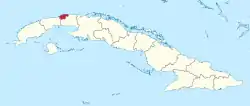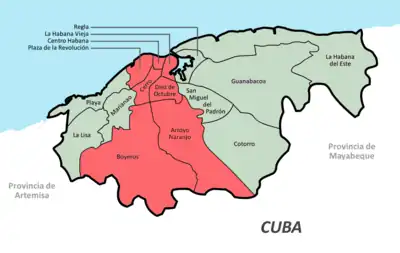La Habana Province
La Habana Province [la aˈβana] ⓘ, formerly known as Ciudad de La Habana Province, is a province of Cuba that includes the territory of the city of Havana, the Republic's capital. The province's territory is the seat of the superior organs of the state and its provincial administration.
Greater Havana
Zona Metropolitana de la Ciudad de La Habana | |
|---|---|
_-_98.jpg.webp)   .jpg.webp) 1. The chinese borough of the cityside of Havana
2. The inside look of the Havana Airport 3. The agrarian university of Havana | |
 | |
| Country | Cuba |
| Region | Western |
| Most populous city | Havana Cityside (2,148,032 inhabitants in the year 2008) |
| Foundation | March 1878 |
| Center of government | Havana Cityside |
| Government | |
| • Mayor | Reinaldo García Zapata |
| Area | |
| • Total | 8,475.57 km2 (3,272.44 sq mi) |
| Highest elevation | 219 m (719 ft) |
| Population (2016)[2] | |
| • Total | 3,749,750 |
| • Density | 440/km2 (1,100/sq mi) |
| Demonym | habaneros-habaneras |
| Time zone | UTC−5 (EST) |
| Area code | +53-47 |
| HDI (2019) | 0.834[3] very high · 1st of 16 |
| Website | www.cubagob.cu |
Between 1878 and 2010, the name referred to a different province that covered a much larger area, and after 1976 restructuring, the then-La Habana Province did not include the city of Havana. The larger province was subdivided in 2010 into the present-day provinces of Artemisa (which also took over three municipalities from Pinar del Río) and Mayabeque.
History
The Province of Havana was created in 1878, is one of the 6 original provinces in which the island was divided, still under Spanish colonial rule.
In the political administrative division of 1976, in which the country was divided into 14 provinces, the original Province of Havana was divided into Havana City Province (Ciudad de La Habana; the capital) and Havana Province (areas surrounding the capital). Havana City Province integrated the territories of the metropolitan region of the capital, including Havana, Marianao, Guanabacoa, Regla, and Santiago de las Vegas. From 1976 until 2010, the provincial administration of Havana Province had its headquarters located in Havana City Province, since it lacked a capital of its own.
On August 1, 2010, the National Assembly made another modification of the territorial organization of Cuba, segmenting the then-Province of Havana (the areas surrounding the capital), colloquially called "Habana Campo", in two new provinces; Artemisa Province to the west, and Mayabeque Province to the east.[4] With this change, which went into effect as of January 1, 2011, Havana City Province became known simply as Havana Province, as differentiation was no longer needed. Additionally, three municipalities of Pinar del Río Province (Bahía Honda, Candelaria and San Cristóbal) were transferred to the new Artemisa Province.
Municipalities

Before 1961, Havana was the official name only of the central municipality of a conurbated area that included at least 6 municipalities: Havana, Marianao, Regla, Guanabacoa, Santiago de las Vegas and Santa María del Rosario-Cotorro. Currently, the territory that occupies the old municipality of Havana (former Villa of San Cristóbal de La Habana) is divided into 6 municipalities (Plaza de la Revolución, La Habana Vieja, Centro Habana, Diez de Octubre, Cerro, Arroyo Naranjo), and Boyeros (Altahabana). The city, as it is conceived at the present time, includes all the provincial territory, also includes the territories of 9 municipalities that were not part of old Havana municipality, which are: Playa, Marianao, La Lisa, Guanabacoa, Regla, Habana del Este, San Miguel del Padrón, Cotorro and Boyeros.
| Municipio | Population | Area (Km2) | Density |
|---|---|---|---|
| Arroyo Naranjo | 200,451 | 82 | 2,445 / km2 |
| Boyeros | 188,217 | 130 | 1,448 / km2 |
| Centro Habana | 140,234 | 3 | 46,745 / km2 |
| Cerro | 122,999 | 10 | 12,300 / km2 |
| Cotorro | 77,066 | 66 | 1,168 / km2 |
| Diez de Octubre | 206,052 | 12 | 17,171 / km2 |
| Guanabacoa | 115,180 | 129 | 893 / km2 |
| La Habana del Este | 174,493 | 141 | 1,238 / km2 |
| La Habana Vieja | 87,772 | 4 | 21,943 / km2 |
| La Lisa | 136,231 | 37 | 3,682 / km2 |
| Marianao | 134,529 | 22 | 6,115 / km2 |
| Playa | 179,647 | 35 | 5,133 / km2 |
| Plaza de la Revolución | 147,789 | 12 | 12,316 / km2 |
| Regla | 42,420 | 10 | 4,242 / km2 |
| San Miguel del Padrón | 153,066 | 26 | 5,887 / km2 |
| Total in the City (Proper) | 1,093,514 | 253 | 4,322/ km2 |
| Total in the Province | 2,106,146 | 719 | 2,929/ km2 |
Neighborhoods
| Municipality | Sections, neighborhoods and towns |
| Arroyo Naranjo | Poey, Santa Amalia, Mantilla, La Palma, Víbora Park, Los Pinos, Managua, Calvario, Güinera, Eléctrico, Párraga. |
| Boyeros | Santiago de las Vegas, Rancho Boyeros, Calabazar, Abel Santmaría, Fontanar, Wajay, Altahabana, Capdevila, Aldabó. |
| Centro Habana | Cayo Hueso, Dragones (Barrio Chino), Colón, Los Sitios, Pueblo Nuevo. |
| Cerro | El Cerro, Casino Deportivo, Las Cañas, Palatino, El Canal. |
| Cotorro | Santa María del Rosario, Cotorro, Cuatro Caminos, Alberro. |
| Diez de Octubre | Víbora, Santos Suárez, Lawton, Luyanó, Sevillano, Vista Alegre, Tamarindo. |
| Guanabacoa | Guanabacoa, Chibás, D'Beche, Minas, Barreras, La Jata. |
| La Habana del Este | Alamar, Camilo Cienfuegos, Guiteras, Villa Panamericana, Cojímar, Guanabo, Boca Ciega, Campo Florido. |
| La Habana Vieja | Barrios del casco histórico, Tallapiedra |
| La Lisa | La Lisa, Alturas de la Lisa, Arroyo Arenas, Punta Brava, Arimao, El Cano, San Agustín, La Coronela. |
| Marianao | Los Quemados, Pogolotti, Los Pocitos, Santa Felicia, El Palmar, Belén, Zamora, Coco Solo. |
| Playa | Miramar, Buenavista, La Ceiba, La Sierra, Kolhi, Siboney, Atabey, Santa Fe, Jaimanitas, Flores, Cubanacán, Almendares. |
| Plaza de la Revolución | El Vedado, Nuevo Vedado, Príncipe, Plaza, Puentes Grandes. |
| Regla | Regla, Casablanca. |
| San Miguel del Padrón | San Miguel, Diezmero, Alturas de Luyanó, Rocafort, San Fco. de Paula, Jacomino, California, Juanelo, La Rosalía, La Fernanda. |
Source: Oficina Nacional de Estadísticas 2010[5]
References
- Oficina Nacional de Estadísticas de la República de Cuba - Consultado en agosto de 2010
- "Cuba: Administrative Division - Provinces and Municipalities" (PDF). ONEI. 2 April 2020. Archived from the original (PDF) on 11 June 2020. Retrieved 3 April 2020.
- "Sub-national HDI - Area Database - Global Data Lab". hdi.globaldatalab.org. Retrieved 2022-01-24.
- Cuba tiene dos nuevas provincias Archived 2010-06-10 at the Wayback Machine
- Mejor atención al pueblo y más funcional Archived 2010-07-26 at the Wayback MachineDiario Granma Archived 2013-12-16 at the Wayback Machine